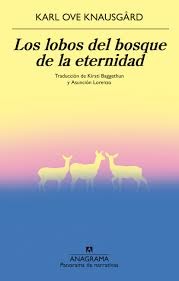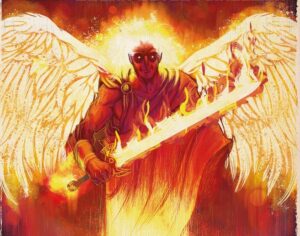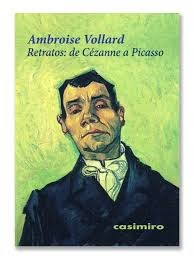
Títutulu Original: The wolves from the forest of eternity
Year of publication: 2021
Translation: Kirsti Baggethun and Asunción Lorenzo
Almost eight years have passed since I tried to read some Karl Ove Knausgard (Kok for friends and enemies) and the experience was quite disappointing. But the fact is that the synopsis of The wolves of the forest of eternity It caught my attention, what together with the insistence of certain trusted readers and readers finished encouraging me. What a fuck. Something will have the water when they bless it!
Well, finished the more than 900 pages of the novel, I have to say that I do not regret it, that in general it seems like a good novel and that I even encourage the chorrochientesmil pages The morning star. Summarizing: I think that the passage of fiction self -fiction has sat to Kok wonderfully.
Before talking about the novel itself, it must be said that The wolves It is the second part of a projected heptalogy (what this man likes to think), but it is not strictly necessary to have read the first part to “find out” of the plot. Perhaps it is convenient, for completing the history of the protagonists, but there are also loose ends that are sure to be tied in subsequent deliveries and here we are.
Now, to the mess. The wolves It is a story of secrets and family relationships, life and death, through about 40 years, two places as different as Norway and Russia and two seemingly antagonistic characters such as Syvert and Alevtina, their two central characters. The above allows Kok to write several (possible) novels within the novel.
For example, the first half of the book can be read as Syvert’s formation novel and focuses on the relationship of a teenage Syvert (and somewhat dumb, worth the redundancy) with his mother and his younger brother, as well as the passage of that of adolescence to maturity, after his first contacts with death, disease and certain family secrets.
For its part, the second half, more centered in fry, can be read as an existentialist novel, very very Russian, in which the personal and professional emptiness of its protagonist occupies a preponderant place and determines, in a certain way, its personal and family relationships.
I do not roll up any more about the plot and go to tell you the best and the worst of the novel.
On the positive side it stands out:
- The treatment of the voices of the protagonists. It is impossible for a 20 type of 20 to speak the same as one of 60, that a Russian biologist speaks like a Norwegian employee of funeral pompas … it looks like a fool but how many novels fall because all its protagonists speak in the same way? Kok differentiates voices perfectly
- Work with the characters. I like how Kok builds, how they evolve throughout the novel.
- The insertion of the landscape into the plot. Forests, lakes, rivers, etc. play an important role in The wolves And there are some other pa (i) Carveriano very powerful, the truth
- The dissection of family relationships, in whose complexity Kok is immersed without shame.
- The dialogues, agile and credible.
On the least positive side you have to cite:
- The excessively extensive initial introduction (if you pass the first 150 pages (approx), you have it)
- Kok’s tendency to introduce scenes and/or characters that little or nothing contributes to the plot. The football side of the novel comes to mind, completely expendable
- Certain excesses linked to the essay. There are a couple of digressions (one in the part of Syvert, another in that of Alevtina) that can be exciting
(If you are interested in evolutionary biology)but that break with the rhythm of the novel and sometimes arrive to despair.
Despite the above, I already tell you that the general impression has been more than favorable. I could even say that I have reconciled with Kok and I think, if I opt for this fictional path, we will have to keep reading him.
A KOK book porrón reviewed in Ulad: the death of the father (and his time trial here), a man in love, has to rain, end, the importance of the novel
Source: https://unlibroaldia.blogspot.com/2025/04/karl-ove-knausgard-los-lobos-del-bosque.html


